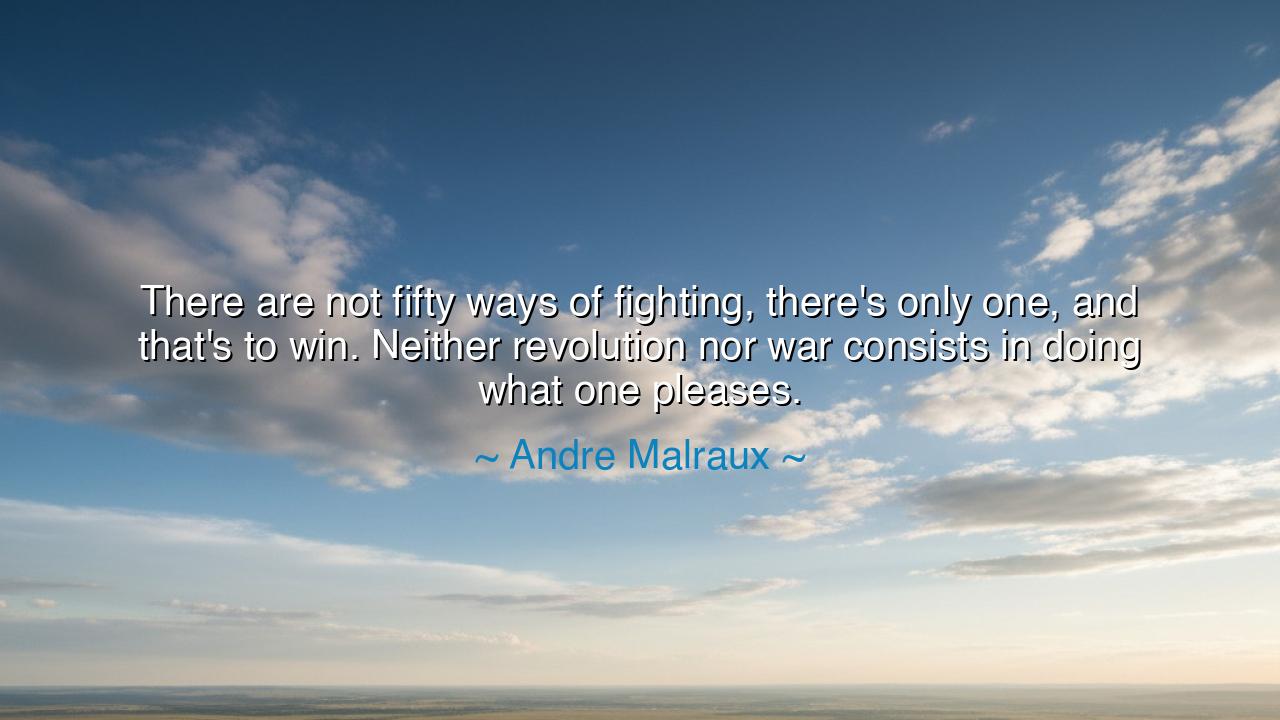
There are not fifty ways of fighting, there's only one, and
There are not fifty ways of fighting, there's only one, and that's to win. Neither revolution nor war consists in doing what one pleases.






Hear, O children of struggle and seekers of wisdom, the fierce words of André Malraux, who declared: “There are not fifty ways of fighting, there's only one, and that's to win. Neither revolution nor war consists in doing what one pleases.” In this saying, he strips away illusion and reminds us of the terrible clarity of conflict: that it is not a game of whims, nor a theater of self-expression, but a crucible where only victory secures survival, and where indulgence in fancy leads to ruin.
For Malraux was no stranger to battle. He had lived through the turmoil of the twentieth century, had seen revolutions rise and fall, had watched men with noble ideals fail because they mistook passion for strategy. To him, fighting was not an art of endless possibilities but a singular pursuit with a singular end. One fights not for the luxury of choice, but for the necessity of victory. To lose in war is not simply to fail—it is to perish, to see one’s people enslaved, one’s cause forgotten, one’s blood poured out in vain.
The truth of his words is written across history. Consider the Spanish Civil War, where Malraux himself was involved. The Republican forces, filled with idealists, poets, and dreamers, often lacked unity and discipline. They quarreled among themselves, fractured their strength, and failed to rally under one command. Against them stood Franco’s forces, ruthless and singular in their purpose. And though the Republicans fought bravely, their divisions led to defeat. Malraux’s lesson was carved into that tragedy: neither revolution nor war can be waged by whim—they demand unity, discipline, and resolve.
Even older tales echo the same truth. In the Peloponnesian War, Athens, once mighty, fell not because its warriors lacked courage, but because its leaders pursued vanity, distraction, and self-interest. They treated war as though it were a stage for personal ambition, forgetting that war punishes hesitation and indulgence. Sparta, hardened and singular in its focus, prevailed. History is merciless in its verdict: those who do not understand the singular necessity of victory are swept away.
And yet Malraux’s words are not meant only for generals and revolutionaries. They speak also to every battle of the human soul. When you fight against despair, addiction, corruption, or injustice, there are not fifty ways—you must fight with your whole heart until you overcome. To treat life’s struggles as matters of convenience or whim is to invite defeat. One cannot dabble in revolution, nor trifle with the demands of transformation. Victory requires total commitment.
But take heed: Malraux does not glorify war. He simply unveils its reality. To fight is dreadful, but once the path is chosen, there is no room for play. The young must learn that courage without discipline is waste, and passion without strategy is ruin. Those who would lead revolutions or resist tyranny must remember his warning: that doing “what one pleases” is not freedom, but folly. True freedom comes only when victory is secured.
Therefore, O children of tomorrow, let this lesson be engraved upon your hearts: when the time comes to fight—whether against external enemies or inner demons—do not scatter your strength. Do not treat the struggle as a theater of whims. Gather all your will, all your courage, all your discipline, and drive it toward victory. For in war and revolution alike, there is but one law: to endure, one must win.
So remember Malraux’s wisdom: there are not fifty ways of fighting—only one. And that way is not to please yourself, but to prevail. Commit wholly to your battles, and you shall stand when others have fallen.






HHnguyen huy hieu
Malraux’s words feel like a reflection on human limits. Both war and revolution are portrayed as forces larger than individual agency, governed by their own logic of survival. His tone reminds me of someone who’s witnessed the cost of both. I wonder whether he’s advocating ruthless pragmatism or mourning the loss of moral choice once violence begins. Can one participate in such total struggle without being consumed by its singular purpose—to win?
MTNgo Pham Minh Tam
There’s an almost existential edge to this perspective. By saying neither war nor revolution is about 'doing what one pleases,' Malraux redefines freedom itself—not as self-expression, but as responsibility. True engagement with history, he seems to say, demands discipline over desire. That idea feels unsettling in an age that glorifies individuality. Is he warning that true collective change requires suppressing personal ego, even creativity, in service of necessity?
VvVVVVVVVVVVV
I can’t help but hear this quote as a rejection of romanticized heroism. Malraux seems to dismantle the myth of the noble revolutionary, insisting that ideals mean nothing if they fail in practice. It’s a sobering reminder that good intentions don’t win wars—organization, sacrifice, and resolve do. Yet, does such realism risk erasing moral boundaries altogether? I’d love to discuss whether victory without moral restraint still qualifies as triumph.
NQNhu Quynh
The absolutism here is striking. 'There’s only one way of fighting—to win' leaves no room for half-measures or compromise. It sounds like a soldier’s creed, but also an artist’s lament: both war and revolution require surrendering individual will to collective purpose. I’d like to explore whether Malraux, as both novelist and resistance fighter, saw this as tragic necessity or as moral discipline—a test of character under historical pressure.
DTDo Thu
This quote resonates as both a strategic truth and a moral provocation. Malraux suggests that war and revolution are not creative enterprises but disciplined struggles bound by necessity. I wonder if he’s pushing back against the illusion that rebellion equals freedom—that even liberation movements must obey their own brutal logic. Does his view imply that success justifies all means, or is he merely acknowledging the harsh structure that survival imposes on conviction?